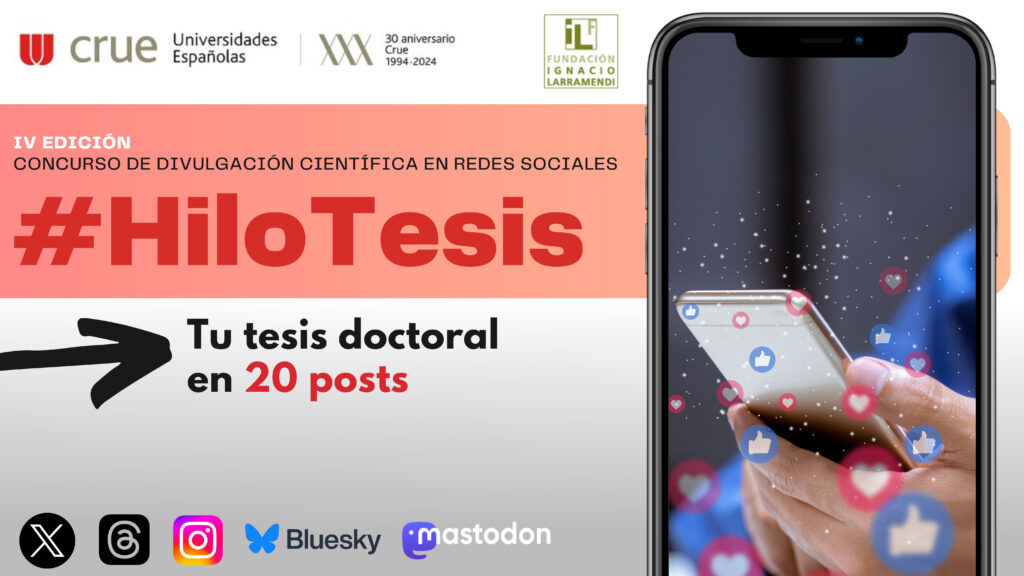
Detection of Depression on Social Networks and Score Retrieval by Humming, Two Theses from CITIC that Competed in the #HiloTesis Contest on Social Networks of CRUE
- The Conference of Rectors of Spanish Universities (CRUE) and the Ignacio Larramendi Foundation promote the fourth edition of the contest aimed at reinforcing the social relevance of research by taking advantage of the possibilities of these communication channels.
- The thesis from CITIC of UDC selected to compete at the national level was that of Miguel Anxo Pérez -directed by researchers Álvaro Barreiro and Javier Parapar- on depression detection using Big Data techniques.
- Researcher Hilda Romero participated with her thesis on musical score identification.
A Coruña, July 22, 2024.- Two researchers from CITIC of UDC have participated in the awards of the #HiloTesis contest promoted by the Conference of Rectors of Spanish Universities (CRUE) aimed at reinforcing the social relevance of research by taking advantage of the possibilities of social networks. In this case, the two authors opted for the X network (formerly Twitter) to present their thesis works through a thread, in which they explained their research in a simple and attractive language.
The thread of researcher Miguel Anxo Pérez-Vila, selected by Universidade da Coruña to participate in the national phase, addresses in his doctoral thesis – directed by researchers Álvaro Barreiro and Javier Parapar- the detection of depression on social networks using Big Data techniques (https://x.com/anxopvila/status/1801682933339640310). Miguel Anxo explains how in recent years, researchers in Big Data, Artificial Intelligence, and computational linguistics have started to use all this information to detect people at risk of mental health, and precisely, his thesis focuses on the detection of depression on networks.
“A problem with current models is that they are often a black box. The results can be accurate, but we don’t always know why. Understanding their functioning and interpreting the results is crucial for the correct practical application of AI,” explains Miguel Anxo Pérez-Vila. This is why the development of his models is based on an interdisciplinary approach and has been carried out in collaboration with health professionals to design and validate these models, so that they are precise and useful tools in real clinical contexts.
The other thesis presented is that of Hilda Romero, who also created a thread on the X network explaining her work: https://x.com/rv_hilda/status/1800161749288853576. This research seeks scores “using an instrument or the voice itself”. To do this, she has worked with the scores of the Folkoteca Galega so that they can be found by humming, “obtaining results with very good precision”, as highlighted by Hilda Romero herself.
“First, we extract 3 characteristics from the scores stored in a format that the computer understands (MusicXML): chromatic and diatonic distance between notes and the rhythm ratio. Now we can obtain these same attributes from an audio of a melody recorded with an instrument. If we compare them with those of the scores, we can find which ones are most similar. Although this task is not so simple,” warns the researcher. The BLAST tool allows searching for similar sequences of nucleotides (DNA and RNA) or proteins quickly and efficiently, “it is widely known in bioinformatics and we have decided to apply it in our field, the alignment between scores and audio,” adds Hilda Romero, who highlights that “better understanding the structure and patterns of music can help in research on its impact on health. Today we know that musical memories are the most resistant to Alzheimer’s and that music influences the brain hormonally,” she concludes.
In the VI edition of the XoveTIC Congress, annually organized by CITIC for research staff in training to share their research, Hilda won the Cátedra Aldaba – WIB (Women, ICT & Business) award: «For the most relevant led as first author by a woman» for the project «Indexing and Retrieval of Scores by Humming Based on Extracted Characteristics», directed by Susana Ladra, José R. Paramá, and Fernando Silva Coira.
The fourth edition of the #HiloCrue contest, in which 384 theses from 47 universities associated with CRUE participated last year, awards six prizes of 500 euros each, thanks to the funding provided by the Ignacio Larramendi Foundation. In the jury’s decision, announced on Monday, July 15, the works of students from the universities of Valladolid (UVA), Valencia (UV), La Rioja (UR), Rey Juan Carlos (URJC), Cantabria (UC), and Autònoma de Barcelona (UAB) are recognized.





